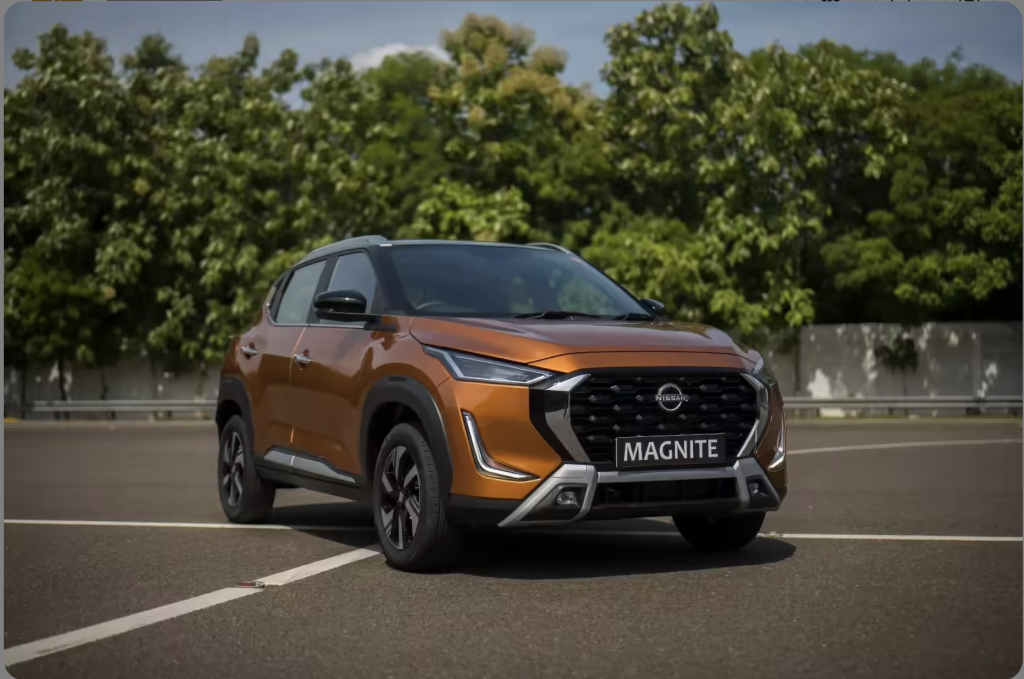Nissan Motor India has officially announced that its Magnite compact SUV is fully compatible with E20 fuel (a petrol blend containing 20% ethanol) and — importantly for owners — that running the vehicle on E20 will not void the warranty for qualifying units.
The company published the update as part of its public statement supporting the Government of India’s move towards higher ethanol blends to reduce emissions and expand renewable fuel use.
What Nissan Said (Short Version)
Nissan’s release states that vehicles manufactured for the Indian market — including the New Magnite — are E20-compatible, and that the company will continue to honour warranty coverage for Magnite units sold after October 2024, as well as for India-manufactured Nissan vehicles that currently have an active warranty.
The company also said it will inspect and address any issues that might arise from the transition to E20 during routine service appointments.
Which Magnite Engines are E20-Ready
Nissan has indicated that its 1.0-litre HR10 turbo petrol engine has been E20-ready since August 2024, while the BR10 naturally aspirated petrol motor achieved compliance in February 2025. That means the brand says both turbo and NA versions of the Magnite are covered under the E20 compatibility claim.
Why This Matters To Owners
India’s rollout of E20 — making petrol with 20% ethanol widely available — has sparked concern among some vehicle owners about potential effects on performance, range, component wear, and whether manufacturers will accept fuel-related warranty claims.
By explicitly confirming that E20 use won’t void warranty for specified Magnite vehicles, Nissan aims to calm those fears and provide continuity of after-sales support while the fuel transition progresses. The assurance also signals Nissan’s confidence that its engine hardware and fuel system components are compatible with the ethanol blend.
What Should Owners Still Do?
Nissan’s statement emphasizes that any issues suspected to be linked to the transition to E20 will be inspected and addressed during regular service, so owners should:
- Keep up with scheduled servicing and have any fuel-related concerns inspected by an authorised Nissan service centre.
- Preserve service records and fuel receipts if they experience a performance or drivability issue and need to raise a warranty claim; clear documentation helps technical teams diagnose root causes. (This is standard best practice when warranty or fuel-related concerns arise.)
Broader Context: Industry and E20 Rollout
Other OEMs have made similar reassurances as India scales up ethanol blending; manufacturers are updating engine calibration and verifying materials to ensure compatibility.
Some automakers and analysts have warned that E20 can affect fuel economy or throttle response in certain engines, especially older models not originally designed for higher ethanol content, but most major manufacturers are providing guidance and warranty commitments for compliant vehicles. Nissan’s announcement joins a string of OEM statements intended to reassure customers during the nationwide E20 shift.
Practical Impact and Takeaway
For prospective buyers and current Magnite owners, Nissan’s confirmation means:
- If you own a Magnite sold after October 2024 (or an India-manufactured Nissan with an active warranty), using E20 should not automatically void your warranty.
- The company says it will continue to support customers through authorised service outlets should E20-related issues arise.
That reassurance reduces a major uncertainty for consumers navigating the fuel changeover, and it reflects the manufacturer’s operational adjustments (engine calibration and component validation) made over the past year to achieve E20 compatibility.
Sources
Nissan Motor India press release and multiple reporting outlets covering the announcement and technical timing of engine compliance. Key public references used here include Nissan’s official statement (Gurugram, 16 September 2025).

